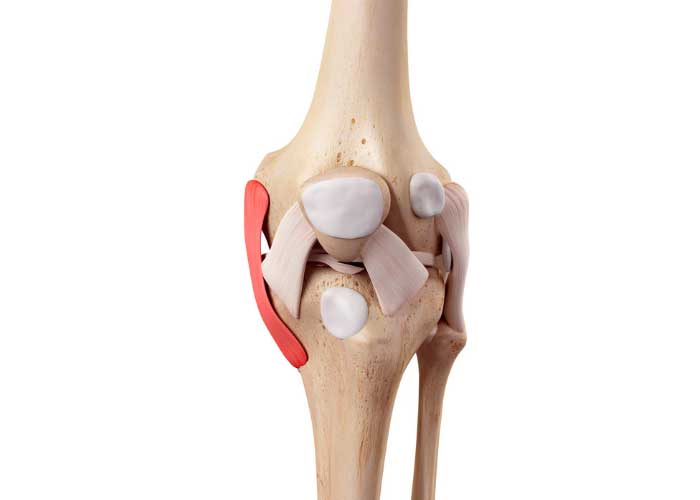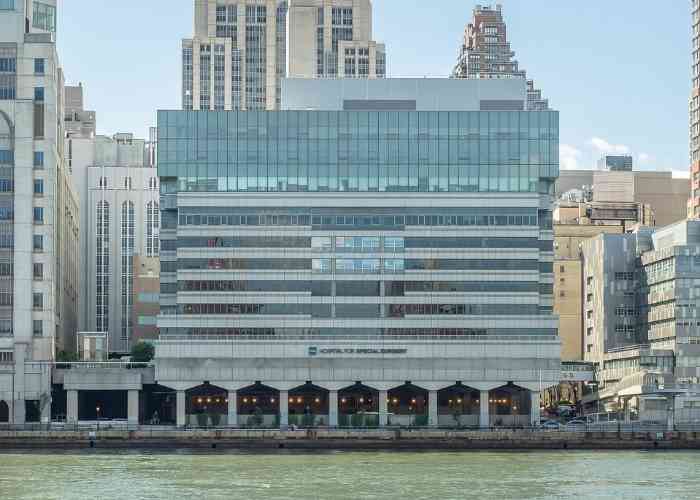What is a medial collateral ligament (MCL) injury?
The medial collateral ligament (MCL) is one of four main ligaments within the knee and is located on the inner (medial) aspect of the knee. The MCL works with the lateral collateral ligament (LCL) to provide medial and lateral stability to the knee joint as well as protection against unusual cutting and pivoting movements. The MCL is the most commonly injured knee ligament and is typically found among athletes that participate in contact sports like wrestling or football. A substantial force placed upon the outer knee can cause a sideways shift of the knee joint resulting in a stretched or torn MCL.

What is the treatment for an MCL injury?
The mild and lower grade MCL injuries can be adequately treated with conservative therapies alone. However, in the event of a complete MCL rupture, or if conservative therapy is unsuccessful, surgical repair or reconstruction of the MCL may be necessary to restore lateral stability to the knee. MCL repair excises the damaged portion of the ligament and then sutures the pieces back together, or fastens them to the bone. If the MCL cannot be repaired, a tendon graft from either the patient (autograft) or donor (allograft) is situated near the damaged MCL. Dr. Answorth A. Allen, orthopedic knee surgeon, treats patients in Manhattan, New York City, Westchester, Long Island and surrounding areas who are in need of an MCL reconstruction.
How is MCL reconstruction performed?
Specialized surgical instruments and sutures are used to excise the damaged portion of the medial collateral ligament, then the sutures are used to bring the remaining portion back together. Occasionally, the use of special surgical anchors is required to refasten the ligament to the bone. If the ligament is beyond repairable, a tissue graft from the patient (autograft) or donor (allograft) is harvested. This tendon graft is placed in the original anatomical position as the MCL to ensure the success of the ligament reconstruction. When the MCL has been repaired, or the tendon graft has been secured in place, the knee is evaluated for stability and range of motion.
What is the recovery period like after MCL reconstruction?
The recovery period after a successful MCL reconstruction is based, in part, on the surgical approach taken by Dr. Allen as well as if a tissue graft was implanted. Health, activity level, age and underlying medical conditions can also play a part in recovery time. In general, most patients can expect to return to normal daily activities in approximately 6 weeks if treated conservatively and 3-4 months if treated surgically. In general, patients in New York can expect the following:
- A knee immobilizer/brace is applied immediately following surgery and worn for approximately 6 weeks
- A combination of rest, ice, elevation, and non-steroidal anti-inflammatory medications are encouraged for pain management. If needed, Dr. Allen will prescribe pain medication to be taken as directed.
- A physical rehabilitation program is instituted as soon after surgery as possible. This can begin with simple stretching exercises and gradually increase to strengthening exercises. Adhering to and completing a physical therapy program is the key to a successful MCL reconstruction recovery.
MCL Tear Surgeon

Are you an athlete that participates in high contact sports? If so, you may be at an increase risk of developing a MCL injury. Damage to the MCL ligament in the knee can cause pain and instability. In more severe cases, surgical treatment may be recommended to restore the ligament. Knee expert Doctor Answorth Allen provides diagnosis and specialized treatment plans for patients in Manhattan, New York City, Westchester, Long Island and surrounding areas. Contact Dr. Allen’s team today!






